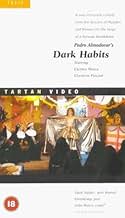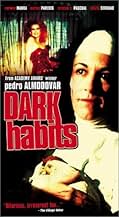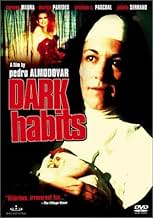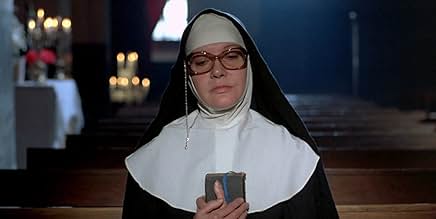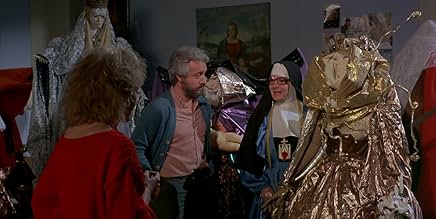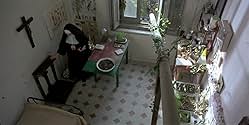NOTE IMDb
6,5/10
8,9 k
MA NOTE
Ajouter une intrigue dans votre langueA nightclub singer seeks refuge with gay nuns on dope in a Madrid convent.A nightclub singer seeks refuge with gay nuns on dope in a Madrid convent.A nightclub singer seeks refuge with gay nuns on dope in a Madrid convent.
- Réalisation
- Scénario
- Casting principal
- Récompenses
- 1 victoire et 1 nomination au total
Cristina Sánchez Pascual
- Yolanda
- (as Cristina S. Pascual)
Miguel Zúñiga
- Madero
- (as Miguel Zuñiga)
Mary Carrillo
- Marquesa
- (as Mari Carrillo)
Rubén Tobías
- Policía
- (as Ruben Tobias)
Concha Grégori
- Sofia
- (as Concha Gregori)
Ángel Sánchez Harguindey
- Periodista
- (as Angel S. Harguindey)
Avis à la une
"Entre tinieblas": "In the Dark" maybe "Wondering about", "Somebody that has lost his/her way" would be the closest translation to the Spanish title.
"Dark Habits" is so parochial, so banal, that changes completely the message of this movie.
I just saw it today, out of nostalgia, since I own a copy, but very seldom I see a movie more than once.
Throughout the years I've seen this one three times! Every time it excels the last view. It isn't the best Almodovar. At the time he didn't have the money (and therefore the incredible terseness of his more recent filmography) nor the experience to make a work of art of every single frame, as he has accustomed us during the last several years. But this films grabs you from the very beginning with such guts that it's impossible to point out its formula.
It's simply magic.
Cristina Sánchez Pascual is not Greta Garbo, but again, like the movie itself, she has "something" in her personality that mesmerizes you whenever she's on the screen.
The way Chus Lampreave ("Sor Rata de Callejón" or "Sister Rat of the Back Alley") delivers her lines is comparable to the way Carol Channing or Eartha Kitt used to delivered theirs: Sheer pleasure to the ears and the brain.
I don't know how it could sound to somebody that needs to read the translation, but for a Spanish speaking person this woman is unique. She could read the telephone book and make it irresistibly funny.
The character of the Marquess (Mary Carrillo) is Almodovar 100%, when she comments to the Abbess Julia: "I'm a cosmetician", "¿Really?", "Of course, see my face?" and she shows an incredibly clownish face that only an inebriated cosmetician would have done.
And the Bolero that Lucho Gatica sings --"Encadenados" "Chained Together"-- is simply so gorgeous that one could melt on the spot out of utter delight, I swear. (I have to find it on "You Tube"!!).
This movie doesn't deserve 8 points, I simply gave it 8 points in my vote because of its masterly ways to grab one's imagination with not too many resources. I adore this movie. It's imperfect, the photography is not very good, the acting leaves a lot to be desired, the sets are in general quite poor..., the script...MMM-mmm, but the movie is sublime!!
"Dark Habits" is so parochial, so banal, that changes completely the message of this movie.
I just saw it today, out of nostalgia, since I own a copy, but very seldom I see a movie more than once.
Throughout the years I've seen this one three times! Every time it excels the last view. It isn't the best Almodovar. At the time he didn't have the money (and therefore the incredible terseness of his more recent filmography) nor the experience to make a work of art of every single frame, as he has accustomed us during the last several years. But this films grabs you from the very beginning with such guts that it's impossible to point out its formula.
It's simply magic.
Cristina Sánchez Pascual is not Greta Garbo, but again, like the movie itself, she has "something" in her personality that mesmerizes you whenever she's on the screen.
The way Chus Lampreave ("Sor Rata de Callejón" or "Sister Rat of the Back Alley") delivers her lines is comparable to the way Carol Channing or Eartha Kitt used to delivered theirs: Sheer pleasure to the ears and the brain.
I don't know how it could sound to somebody that needs to read the translation, but for a Spanish speaking person this woman is unique. She could read the telephone book and make it irresistibly funny.
The character of the Marquess (Mary Carrillo) is Almodovar 100%, when she comments to the Abbess Julia: "I'm a cosmetician", "¿Really?", "Of course, see my face?" and she shows an incredibly clownish face that only an inebriated cosmetician would have done.
And the Bolero that Lucho Gatica sings --"Encadenados" "Chained Together"-- is simply so gorgeous that one could melt on the spot out of utter delight, I swear. (I have to find it on "You Tube"!!).
This movie doesn't deserve 8 points, I simply gave it 8 points in my vote because of its masterly ways to grab one's imagination with not too many resources. I adore this movie. It's imperfect, the photography is not very good, the acting leaves a lot to be desired, the sets are in general quite poor..., the script...MMM-mmm, but the movie is sublime!!
Maybe the one line summary is wrong, that's the problem with Pedro Almodovar's flick, you don't know what its supposed to be: ironic, satire, parody, black comedy or a serious drama. It's got a lounge singer hiding out in a convent (remember this is a 1983 movie, made way before Sister Act) after her lover ODs. The nuns are former losers, street trash, etc. who are given punishable names like Sister Rat-in-the-Sewer or Sister-Damned and their Mother Superior shoots up heroin. Are they making fun of Catholics or what? Nevertheless, this is a bit funny, while being a little boring. Recommended to the Almodovar/Spanish/foreign fans who shouldn't expect this one to be better than his usual films.
What else do you need to know? Honestly, this isn't Almodovar's best work. In fact, it's pretty sloppy story-wise. But I enjoyed the heck out of it. Cristina Sanchez Pascual plays a heroin-addicted singer who hides out in a convent after her boyfriend overdoses. The nuns there are, shall we say, a little quirky in that they are mostly on drugs (heroin, cocaine, acid - but not pot; at one point a nun says "you know I don't do soft drugs"). Also, one's a lesbian and another writes lurid romance novels and together they have raised a pet tiger. They all have names like Sister Snake and Sister Rat, because the humiliation is sacred. There's really no compelling reason the nuns are on drugs. It's just kind of a shocking, humorous detail. I think Bunuel would have loved it, though the film itself isn't particularly blasphemous. It doesn't view the nuns or Catholicism cynically. It just exists in its own, weird Almodovar universe. The plot is not very strong, so the whole thing just kind of fizzles, but it's entertaining. Carmen Maura plays one of the nuns, but she's not an extremely important character. On the Region 1 DVD, though, she graces the cover.
"Dark Habits" from 1983 was Pedro Almodovar's first film made with a decent producer, film company, and budget.
There are signs of his later brilliance in films like "Woman on the Verge of a Nervous Breakdown" and "All About My Mother," but even for the quirky Almodovar, this is one strange film.
"Sister Act" is vaguely reminiscent of this movie, only in the fact that "Dark Habits" concerns Yolanda, a nightclub performer (Cristina Sánchez Pascual) whose boyfriend (Will More) overdoses while she's in his apartment.
Yolanda panics, afraid she will be accused of killing him by the police, so, wearing her red sequined gown, she hides out in a Madrid convent.
This is unlike any convent depicted before or since. Some of the nuns, like Yolanda herself, are drug addicts, doing heroin and coke. One nun has a pet tiger. Another writes sexy novels under a pseudonym. Another nun designs fashions and is in love with the local priest.
The Mother Superior is a lesbian and falls in love with Yolanda. The nuns all have strange names, depicting that man is the lowest form of animal: Sister Snake, Sister Rat, etc.
The big problem at the convent at the moment is that the Marquesa (Mary Carillo), now that her generous husband is dead, has decided to withdraw patronage from the convent. One of the nuns gets information about the Marquesa's daughter and decides to blackmail her with it.
"Dark Habits," I believe, suggests the Movida Madrilenia, a hedonistic countercultural movement that took place in Madrid after the death of Franco.
It was meant to represent a new Spanish identity, an identity characterized by freedom of expression, use of recreational drugs, and even a new dialect.
It was a hedonistic culture that more or less destroyed itself by the overuse of heroin. At the end of the era, Madrid was left with drug addicts, dead junkies, people leaving Madrid for their original hometowns, and for others, rehabilitation and a useful life.
The convent serves as a microcosm of this movement. Here one sees art, drugs, music, and homosexuality.
A fascinating if sometimes uncomfortable film, and certainly not representative of the later Almodovar, who himself has distanced himself from this offbeat, dark film.
There are signs of his later brilliance in films like "Woman on the Verge of a Nervous Breakdown" and "All About My Mother," but even for the quirky Almodovar, this is one strange film.
"Sister Act" is vaguely reminiscent of this movie, only in the fact that "Dark Habits" concerns Yolanda, a nightclub performer (Cristina Sánchez Pascual) whose boyfriend (Will More) overdoses while she's in his apartment.
Yolanda panics, afraid she will be accused of killing him by the police, so, wearing her red sequined gown, she hides out in a Madrid convent.
This is unlike any convent depicted before or since. Some of the nuns, like Yolanda herself, are drug addicts, doing heroin and coke. One nun has a pet tiger. Another writes sexy novels under a pseudonym. Another nun designs fashions and is in love with the local priest.
The Mother Superior is a lesbian and falls in love with Yolanda. The nuns all have strange names, depicting that man is the lowest form of animal: Sister Snake, Sister Rat, etc.
The big problem at the convent at the moment is that the Marquesa (Mary Carillo), now that her generous husband is dead, has decided to withdraw patronage from the convent. One of the nuns gets information about the Marquesa's daughter and decides to blackmail her with it.
"Dark Habits," I believe, suggests the Movida Madrilenia, a hedonistic countercultural movement that took place in Madrid after the death of Franco.
It was meant to represent a new Spanish identity, an identity characterized by freedom of expression, use of recreational drugs, and even a new dialect.
It was a hedonistic culture that more or less destroyed itself by the overuse of heroin. At the end of the era, Madrid was left with drug addicts, dead junkies, people leaving Madrid for their original hometowns, and for others, rehabilitation and a useful life.
The convent serves as a microcosm of this movement. Here one sees art, drugs, music, and homosexuality.
A fascinating if sometimes uncomfortable film, and certainly not representative of the later Almodovar, who himself has distanced himself from this offbeat, dark film.
It's not very often that you can go back this far in a director's career and find a film this good.
It's sure as hell not sentimental; it's a black comedy - you've got parody, satire and a dark-humour rolled into one.
There already signs of Almodóvar's skill at film-making, already touches of Almodóvar's trademark whit and humour. It starts out with a girl at a crossroads in her life: on the one hand, a drug fuelled crazy future the other, the stability of a convent. Or is that the other way round? For those familiar with Almodóvar's films, there are some of the reoccurring themes you'd expect to find, amongst others: prostitution, nuns, drugs, and dealers. More specifically, Dark Habits seems to deal with (to me anyway) a novelist (Almodóvar's film's often touch on creativity/ those involved), the idea of what is good, and along a similar vain, our abilities to turn a new leaf.
Obviously being in subtitles is going to exclude this for some, but others are whole-heartedly recommended; even if it isn't the best Almodóvar film, I've found it the most enjoyable so far. (I haven't heard a quote better than "I'm Sister Rat of the Sewers. I was keen to meet you" recently.)
Oh, and look out for the tiger ;-)
It's sure as hell not sentimental; it's a black comedy - you've got parody, satire and a dark-humour rolled into one.
There already signs of Almodóvar's skill at film-making, already touches of Almodóvar's trademark whit and humour. It starts out with a girl at a crossroads in her life: on the one hand, a drug fuelled crazy future the other, the stability of a convent. Or is that the other way round? For those familiar with Almodóvar's films, there are some of the reoccurring themes you'd expect to find, amongst others: prostitution, nuns, drugs, and dealers. More specifically, Dark Habits seems to deal with (to me anyway) a novelist (Almodóvar's film's often touch on creativity/ those involved), the idea of what is good, and along a similar vain, our abilities to turn a new leaf.
Obviously being in subtitles is going to exclude this for some, but others are whole-heartedly recommended; even if it isn't the best Almodóvar film, I've found it the most enjoyable so far. (I haven't heard a quote better than "I'm Sister Rat of the Sewers. I was keen to meet you" recently.)
Oh, and look out for the tiger ;-)
Le saviez-vous
- AnecdotesPedro Almodóvar's first film to have a proper producer and be made for a proper film company, rather than be made on the hoof like his previous projects. Almodóvar has since distanced himself from the film as he felt that he had to bow to commercial considerations.
- GaffesThe "Salí porque salí" song is obviously not sung by Yolanda nor the backing vocalists.
- ConnexionsReferenced in El Coleta & Jarfaiter: El Piko 3 (2014)
- Bandes originalesSalí porque salí
Written by J. Curiel Alonso
Arranged by Miguel Morales
Performed by Sol Pilas
Edited by Música Latina N.Y. (USA)
Meilleurs choix
Connectez-vous pour évaluer et suivre la liste de favoris afin de recevoir des recommandations personnalisées
- How long is Dark Habits?Alimenté par Alexa
Détails
- Durée
- 1h 54min(114 min)
- Mixage
- Rapport de forme
- 1.66 : 1
Contribuer à cette page
Suggérer une modification ou ajouter du contenu manquant

![Regarder Tráiler [VO]](https://m.media-amazon.com/images/M/MV5BZTI5ZGZmNGEtZmM0Mi00ZmUxLWI0ZGMtMmZmODQ0NDQzMTY5XkEyXkFqcGdeQXRyYW5zY29kZS13b3JrZmxvdw@@._V1_QL75_UX500_CR0)


